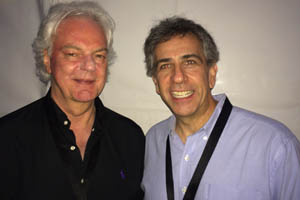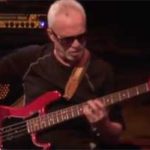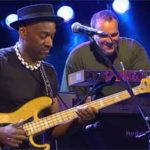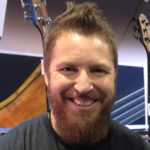Rock & roll workhorse tells all about his bass playing days with Cozy Powell, Whitesnake, Black Sabbath and Brian May
Exclusive interview with FBPO’s Jon Liebman
June 27, 2011
Neil Murray has a long history playing bass for some of the biggest names in rock, including Whitesnake, Black Sabbath, the Brian May Band, Vow Wow, Cozy Powell’s Hammer, Eric Clapton, Sting, Gary Moore and many others. Since 2002, Neil has played in the Queen musical We Will Rock You in London.
FBPO: How would you describe your musical upbringing?
NM: My family is fairly artistic and musical. I had piano lessons for five years, beginning at age 8, then I studied trombone during my teenage years. We heard a big variety of music at home, ranging from Mozart to folk to jazz. I’m glad I was exposed to all kinds of styles, as my taste is pretty wide and I enjoy playing lots of different types of music. It’s a shame I’m categorized as a heavy rock bassist, as I don’t often get asked to do other types of music. Of course, if you don’t play a style of music much, you won’t be as good at it as someone who concentrates on that style all the time.
FBPO: How did you end up as a bass player? In addition to piano and trombone, didn’t you also play drums?
NM: I took up the drums when I was about 12 and played in a couple of rock/blues bands at school in the mid ’60s. When I got hold of a bass when I was 17, I discovered that it was the instrument I should be playing. Even when I was a drummer, I used to listen to the bass and I am certainly a better bassist than I was a drummer! It was actually a guitar which someone had converted to a bass. After that, I built a not-very-good Gibson EB3 copy in the woodwork shop, using some of the parts from the converted guitar.
My first proper bass was a Fender Mustang, which I customized with different pickups in order to sound closer to Jack Bruce, Andy Fraser and Tim Bogert, who were my big influences back then. I went to art college to study graphic design, but I used to spend more time playing along with albums. By the time I left, I was more focused on becoming a bass player than pursuing a career as a designer.
FBPO: Can you identify a turning point, a defining moment, when you realized you were going to make your living as a musician?
NM: There wasn’t one particular moment. Playing bass just became my main obsession during the four years I was at college. I had made some half-hearted attempts to get a job as a designer after graduating and I was working in a factory making desk toys for executives during 1973. I was also playing complex fusion music in a band called Gilgamesh at the same time, doing small clubs and pubs mostly. I went for a couple of auditions, including T. Rex and Supertramp, but didn’t get chosen.
Through Clive Chaman, the bassist in the Jeff Beck Group in 1971-’72, who taught me and influenced me a lot, I joined a band called Hanson, that was playing Hendrix-type rock. They were signed to ELP’s label, Manticore, so I turned professional at the end of 1973 and flew to LA to record an album with Hanson. As far as making a decent living through playing the bass, it wasn’t really until I was about 30 years old, when Whitesnake was becoming successful.
FBPO: You did quite a bit of work with drummer Cozy Powell. What can you tell our readers about your relationship with him, both professional and personal?
NM: I had seen Cozy play with the Jeff Beck Group alongside Clive Chaman and when Cozy had some hit singles in 1974, Clive was also the bass player in Cozy’s band, Hammer. I stood in for Clive on around a dozen shows in 1974 and ’75 and that’s how I got to know Cozy. After that, it wasn’t until I rejoined Whitesnake in late 1983 that I spent much time with Cozy. After that, we did various sessions together and worked together in Black Sabbath on two separate periods, in the Brian May Band and with the Peter Green Splinter Group.
When we worked together, we got on very well, but I didn’t see much of him outside of touring and recording. He enjoyed the quiet of the countryside, being with animals or tearing around in fast cars! Of course he was a very powerful and exciting drummer to play with. I used to try to be in sync with his playing as much as possible so as to make the rhythm section as strong as it could be. He was certainly one of the best rock drummers, though I know he’d have liked to play a bit more challenging music, such as when he was with Emerson, Lake & Powell.
FBPO: How would you describe your experience with Whitesnake?
NM: Whitesnake went through many phases, starting in 1978 as a club band, playing very down-to-earth blues/rock. At that time, and for the next three or four years, it was great fun to be part of it, with lots of humor and not taking things too seriously on stage. The lineup changed at various times between 1982 and 1987 and each time, things got more serious in terms of being more conscious of what was required to break through in the USA.
Musically, I enjoyed all the periods of the band I was part of (1978-83, then 1984-86) and I could see the need to change styles and fit in more with the sound of the mid-80s. David Coverdale changed quite a lot too, becoming much more educated and sophisticated, but it was still an enjoyable situation with all of the different musicians I worked with in the band.
In the first five years, I got to play lots of moving bass lines, as the songs allowed for that. I was attempting to make the bass lines more interesting than might normally be the case in blues-based rock. Also, the producer, Martin Birch, mixed the bass loud, which helped it stand out. Later on, the songs and the production didn’t lend themselves as much to such upfront bass parts.
FBPO: Whitesnake has sure gone through a lot of bass players? It’s often said you were the very first one. Is that true?
NM: Strictly speaking, no, I wasn’t the first. When the band was starting up in the fall of 1977, the bassist was Chris Stewart, from Frankie Miller’s band. One day he couldn’t make it to rehearsal, so guitarist Bernie Marsden, who I’d played with in Cozy Powell’s Hammer, asked to fill in for Chris in order to audition a drummer. A couple of weeks later, Chris decided to return to Frankie Miller, so I got the call to audition properly and joined the band before it did any gigs or recording, in January 1978.
FBPO: What kind of basses were you using?
NM: At that point, I was playing a Precision with flatwound strings, which I used on the first album, Trouble. After that, I often used a borrowed Alembic bass with La Bella quarterwound strings, recorded in stereo. I played on all the Whitesnake albums until Slip Of The Tongue, though on Slide It In, in 1984, I only played on the U.S. remix version of the album, replacing what Colin Hodgkinson played on the European and Japanese version. On Slide It In I used a B.C. Rich Mockingbird bass and on the 1987 Whitesnake album I partly used a Kubicki Ex Factor bass and another borrowed Alembic.
FBPO: Tell me about your stint with Black Sabbath.
NM: Cozy Powell had joined Sabbath a couple of years after leaving Whitesnake in early 1985, and recorded the album Headless Cross with them. A great jazz/session bassist named Laurence Cottle played on the album, but they needed a permanent member to go on tour. I had just finished working with the Japanese band Vow Wow, so I was free to try out for Sabbath when Cozy suggested my name to Tony Iommi. Although I was having to juggle Geezer Butler’s heavy bass parts from the classic Sabbath tracks, I also had to cover the more complex parts which Laurence Cottle had played on Headless Cross, in particular the intro to “When Death Calls,” which uses arpeggios of false harmonics. In fact I’d learned to do false harmonics before Jaco used them on “Birdland,” though I’m sure no one believes me!
We toured a lot in 1989-90 and again in 1995 when I rejoined the band. I was never totally happy with the sound I had in that situation, though, partly because the style of songs varied a lot, from ultra-heavy to semi-AOR, so it was hard to find a bass that worked for everything. At that time I was using various Aria basses, though I also tried my Precision. Tony Iommi is a very creative musician who likes to jam a lot and, in fact, the band came out of the same ’60s U.K. blues scene which got me interested in playing bass in the first place. So my style shared a lot in common with Geezer’s when it came to the looser sections of the songs. However, the hardcore Sabbath fans only really wanted to see Geezer as the bassist, so it didn’t matter how I played, as I wasn’t Geezer!
The first album I did with the band was called Tyr, with many of the songs having a Norse legend theme to the lyrics to get away from the demons and devils imagery for once. The bass is rather buried on that album, which is a shame. Cozy was co-producing and I guess he thought the drums were more important! I did another album called Forbidden, but the production tried too hard to be influenced by hip-hop and the rhythm section sounds pretty weak. Live, the songs from that album worked much better.
FBPO: How about Brian May?
NM: Brian is a good friend of Tony Iommi and he used to jam on “Heaven & Hell” with us when we played in London. Cozy and I were his favorite rhythm section at that time, 1989-90, so when he was putting a band together to tour under his own name after Freddie Mercury died, we were his ideal choice and we were both available. We did a little recording, then a big tour in 1993, often opening for Guns N’ Roses. Brian is a great guy to work for and a wonderful guitarist. I enjoyed playing Queen songs, though of course I had to stick closely to what John Deacon played.
We recorded some tracks for Brian’s next solo album, Another World, but, sadly, by the time it was released, Cozy had died in a car crash. We did some touring to promote the album, but it wasn’t as successful as the previous one, partly as five years had elapsed between them. Brian’s songs don’t lend themselves to a lot of freedom for the bass, as they’re quite structured, but it’s still a privilege to play with such a fine musician.
FBPO: How would you describe the Queen musical, We Will Rock You? I’m guessing you’re really enjoying it, as you’ve been doing it for quite a while.
NM: We Will Rock You has a fairly flimsy storyline, set three hundred years in the future. It’s not the story of Queen, though we play about thirty of their most famous songs in it. Often the songs are edited down with extra instruments and sometimes dozens of singers, so I find I have to be more forceful in order to cut through than if it was just piano, guitar, bass, drums and vocals.
It’s closer to a rock show than just about any other musical, but it still means playing the same songs six nights a week, every week of the year for nine years! By now, I’ve used up all my ideas for the little spots where I can throw in something of my own. It’s great to be part of something so successful. I must have played to nearly three million people over the years, but to do exactly the same thing every day is not ideal for me. It’s nice to have a steady paycheck though!
FBPO: What else is keeping you busy these days?
NM: For most of the last twelve years, I’ve been touring on and off, playing Whitesnake songs with one or two other original members. The latest version is Snakecharmer, which includes guitarists Micky Moody of Whitesnake and Laurie Wisefield of Wishbone Ash, together with singer Chris Ousey, keyboard player Adam Wakeman and drummer Harry James. We do songs from the 1978-83 period of Whitesnake, keeping close to the blues/rock style of the band from that era. We are optimistic about working a lot in the next few years.
I also do bits of recording for various projects, often putting the bass track down in my home studio and sending it back via the Internet, which is how a lot of tracks are recorded these days, as no-one has the budget for recording everyone together in a studio. I did a Michael Schenker Group album, In The Midst Of Beauty, in 2009 and I toured Japan as guest bassist with them the following year.
FBPO: You’ve already done so much in your life and your career. What else would you like to accomplish that you haven’t done yet?
NM: There are still thousands of great musicians I’d love to play with. I definitely like to work with a band where there’s a lot of freedom to play what I feel like, as I’ve done so much in the last twenty-five years, where I’m copying someone else’s parts or even my own parts from old albums! If I had been cleverer, I would have done a lot more songwriting, though, admittedly, I never got any encouragement in the past, so that’s something I ought to concentrate on. Someday I can see myself writing my version of what happened in the bands I played with. It’s just a matter of finding the time.
FBPO: What would you be if you weren’t a bass player?
NM: I guess something a bit creative, such as the graphic design I trained for or perhaps a record producer. I occasionally mentor young musicians and that’s quite fulfilling, though hard work!







